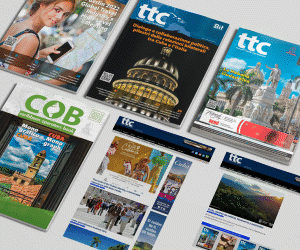
Statistics indicate that 21 million travelers stopped arriving to the paradisiacal islands in 2020. Photo: konstanttin/123RF
By Frank Martin
No doubts about it. Covid-19 epidemic has been the worst event that the Caribbean has suffered in its recent tourist history.
Statistics indicate that 21 million travelers stopped arriving to the paradisiacal islands in 2020. In 2021 the improvement has been even worst.
Last year’s figure mean an 80 percent loss compared to 2019.
Another catastrophic number is that during the first year of the global pandemic the Caribbean regional economy went down almost in 66%.
The image of the epidemic on the picturesque and smiling tourist Caribbean is that of empty hotels and restaurants, deserted attractions, closed borders, laid off workers and paralyzed airlines and cruise lines.
The biggest drop numbers among Caribbean customers last year was for Americans. But Canadians and Europeans also disappeared.
Certainly there is great Caribbean regional nostalgia about travelers from Spain, Italy and Great Britain.
The good news but still partial is that plans for the long-awaited return of the Europeans are already being reactivated.
And the era of “smart” tourism is coming from Spain.
The Inter-American Development Bank has already announced that it will promote smart tourism from Spain to the Caribbean.
The Spanish government disclosed that digital and emerging technologies will play a crucial role in this type of tourism.
The method of Spain and IDB will consist in applying a model entitled Smart Tourist Destinations that will integrate tourism and health security measures.
There are already pre-investment technology plans and innovative project designs favorable to digital and emerging technologies in Latin America and the Caribbean.
Tue model has been described as a tool to face challenges of the sector, improve its competitiveness and develop a long term sustainable model, according to the Spanish news agency EFE.
But even the reality of the epidemic in both Spain and Latin America and the Caribbean is an obstacle for the program.
Nowadays Caribbean islands are still fighting outbreaks of the coronavirus, which determines that they must accept only low numbers of foreigners and tourists.
In Spain, closures, confinements and measures in general that restrict travel to and from abroad are still in force.
In Italy tourists are already preparing to travel again, but they still do not have the government “go-ahead”.
Italy is yet severely affected by the pandemic but there is a fight for openness in both directions.
However Italian government still maintains its advice and restrictions on travel to and from abroad.
Until April beginning in Italy official advice indicates not to travel abroad for health security reasons.
The authorities are very cautious not only about abroad tourism world but nationals to other nations.
The impassive British have devised a traffic light perhaps “very British” for citizens who want to spend holidays in other countries.
The Great Britain pandemic has been one of ups and downs.
This week Transport Secretary Grant Shapps said that Brits “can start thinking about booking overseas holidays again this summer.”
Mr. Shapps provided details on a traffic light system that will allow visitor in after classification tests.
Once this system is in place travelers from United Kingdom will have to undergo tests before leaving and when returning, even from “green” countries, the color with which low-risk places will be classified.
At the moment the British government has thrown the red light.
Mr Shapss himself told the BBC that “I do not advise against booking holidays abroad.”
But he begged the citizens to be attentive to the lights of this peculiar traffic light.

MORE NEWS














